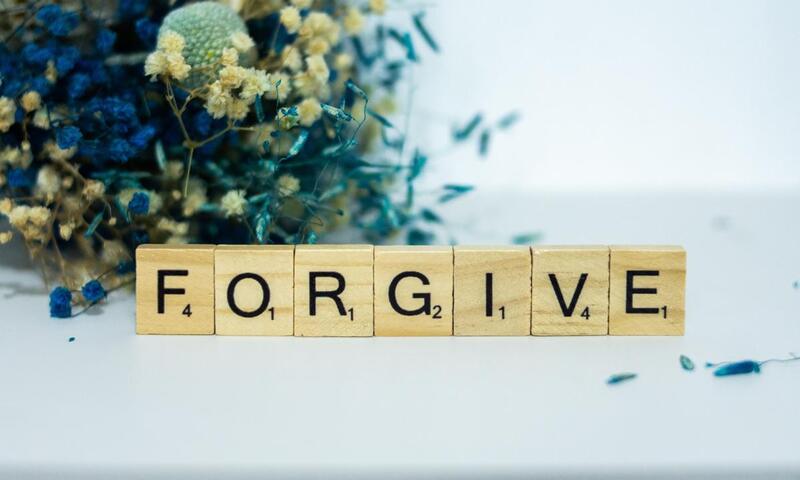Why Should I Forgive?

Are you holding on to any grudges? In today's blog, Mandy Fischer writes tips about how to extend forgiveness to those who have hurt you as well as how to ask forgiveness from someone.
Forgiveness is Essential in Every Relationship
"Everyone says forgiveness is a lovely idea, until they have something to forgive."
- C.S. Lewis, Mere Christianity
We all desire to be forgiven for our mistakes, but initiating forgiveness is much more difficult for our hearts. Forgiveness is not ignoring injustice and glossing over the wrongs, but addressing the situation so that both parties understand the emotions and expectations for the future. In many relationships in our lives, there will be instances where we need to grant forgiveness as well as times we need to ask for forgiveness.
Why Should I Forgive?
There may be tension and resentment you have towards someone for hurting you, but holding on to grudges and pain aren’t going to ease the conflict. In Colossians 3:13, it says, “Bear with each other and forgive one another if any of you has a grievance against someone. Forgive as the Lord forgave you.” As Christians, we are called to treat others with compassion and forgiveness, and in this verse particularly, we are reminded of how God forgave us by sending Jesus to die for us. Forgiveness is the process of taking them off your hook, and putting them on God’s hook.
3 Steps to Extend Forgiveness
When you are having difficulty extending forgiveness, use these three steps to help break down the conflict and allow you to move on in a healthy way.
-
Acknowledge the pain that this person has caused you. Feelings of hurt, disrespect, and disappointment may arise. However, there may be deeper tension in your heart and extreme feelings of bitterness, anger, or resentment. Before you start extending forgiveness, it’s essential to unpack your own feelings and understand which emotions you feel.
-
Pray and process through this hurt, and it will allow you to begin restoring the relationship. Granting someone forgiveness doesn’t mean that your trust is immediately restored, but it allows you to begin the process of healing. It’s useful to ask for God’s help to let go of grudges and for empathy in forgiving someone. He delights to do the work of forgiveness in us, through us, and for us.
-
Communicate your forgiveness. Here’s an outline of how a productive conversation could go when sharing how you feel hurt and how you can move forward.
-
Bring up the topic and describe what they specifically did that hurt you.
-
Articulate your expectations and what you would like to see differently in the future.
-
Give up your right to get even. Being in the revenge mindset is going to keep you on edge to look for opportunities to hurt them back. Instead, choose a Christ-like mindset (Romans 8:6) and focus on forgiveness and restoring the relationship, not looking for ways to hurt them back.
-
Let go of blame, resentment, and negativity. It’s a choice to even be willing to overcome these emotions, and even if it takes a while to process them, it’s the best way to restore your relationship.
-
Communicate your act of forgiveness specifically. Say, “I forgive you for…”
-
Work towards reconciliation. After a conflict, intimacy and trust may not come right away; they may need to be rebuilt over time.
3 Steps to Seeking Forgiveness
“I’m sorry. I was wrong. Please forgive me.” These eight words may be so difficult to say, but they can change your life. Whenever we do something that hurts another person, we need to admit when we’re wrong.
-
The first step is to apologize specifically for hurting the person and assure you won’t do it again.
-
Ask for forgiveness and allow the person to make the decision to forgive you. Your “sorry-ness” focuses on you, while asking for forgiveness focuses on the person you hurt. Just because you said you’re sorry doesn’t mean they will forgive you immediately. They might, but sometimes it takes more time to move past the wrongdoing and the hurt.
-
If you know you’ve made a mistake, seek forgiveness from God and from the people you’ve hurt. It’s much more freeing to repent and ask forgiveness than to hold on in silence to the things you know are wrong.
What If You Don’t Know Why Someone’s Angry at You?
Have you ever been in a situation where someone is mad at you, and you don’t know why? If you don’t feel like you did anything wrong, it becomes a pseudo apology when you apologize but don’t truly know what it’s for. Even if you don’t fully understand the hurt you caused someone, Philippians 2:3-4 reminds us to, “Do nothing out of selfish ambition or vain conceit. Rather, in humility value others above yourselves, not looking to your own interests but each of you to the interests of the others.” Put yourself in the other person’s shoes when they feel hurt and try to truly understand why they are upset. It can help you understand why they resent you. Then you can provide a genuine apology.
Throughout all relationships in our lives, we will need to forgive others and to ask for forgiveness. Take the time right now to consider:
-
Are there any grudges you are holding on to? Pray about how you can release them and extend forgiveness for them.
-
Is there anything you need to ask someone’s forgiveness for? Seek the Lord’s forgiveness first and then the other person’s.
If anyone came to mind that you realized you need to forgive or ask forgiveness from, follow the steps above to begin the process of reconciliation. You can experience emotional freedom from the guilt or grudge and shift your focus to healing and restoring that relationship.



